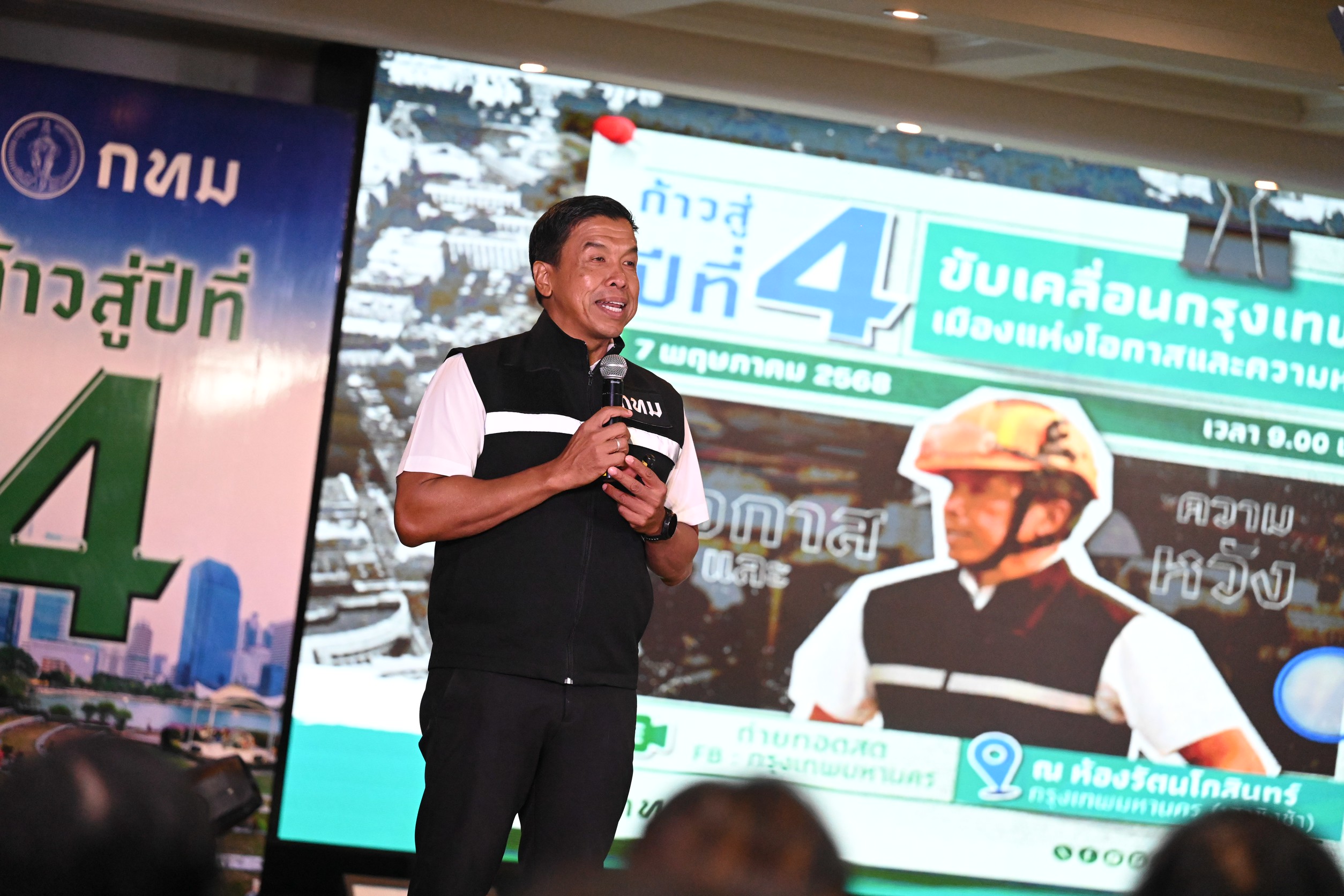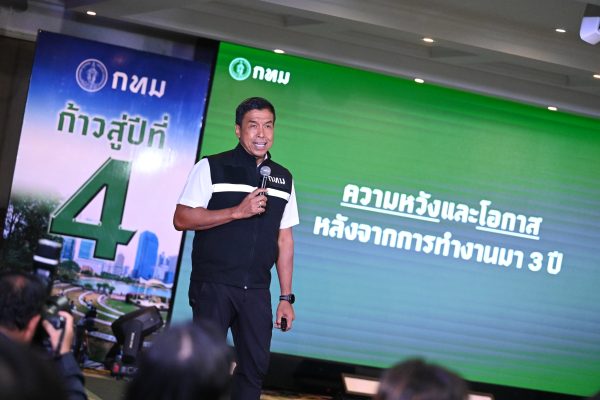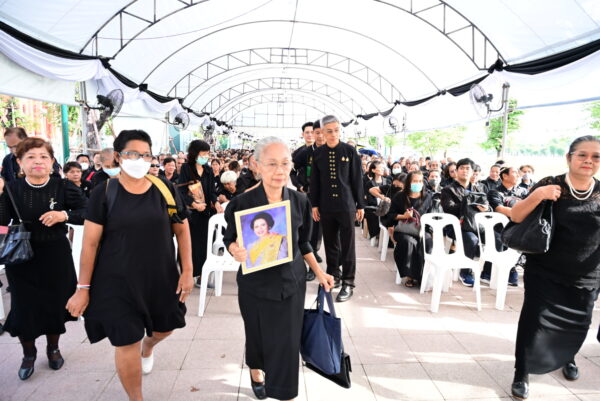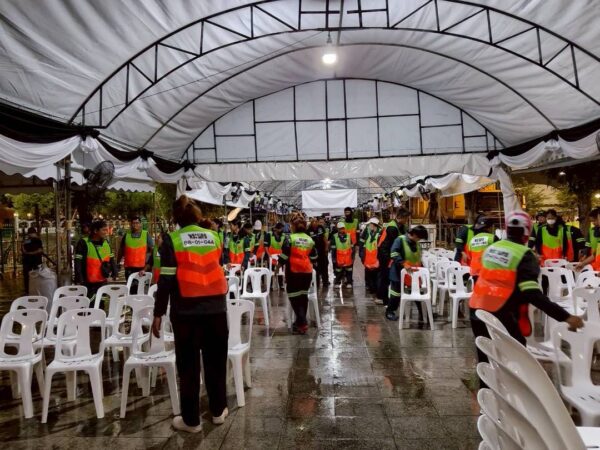
(May 7, 2025)—Governor Chadchart Sittipunt has unveiled his vision for Bangkok’s fourth year in office, outlining a comprehensive strategy focused on enhancing the city’s efficiency, liveability, and opportunities.
Marking his third anniversary, Governor Chadchart presented his ” 9 guiding policy 9 good”, emphasising the integration of technology and collaborative efforts to propel Bangkok towards a brighter future.
At a press conference held at Bangkok City Hall, Governor Chadchart, alongside his team of Deputy Governors, reiterated his commitment to building trust between the government, private sector, and the public.
He stressed the importance of knowledge, technology, transparency, and empathy as cornerstones of his administration.
“The heart of our work is building mutual trust between the government sector, the private sector, and the public sector. This trust arises from work that encompasses three components: 1) knowledge and technology, 2) transparency and accountability, and 3) empathy. Moving forward, we are ready to lead the team ‘Entering the 4th Year, Driving Bangkok Towards a City of Opportunity and Hope,’ a city heading towards the future without leaving anyone behind,” Governor Chadchart said.
A key focus of Governor Chadchart’s tenure has been fostering public engagement. The Traffy Fondue platform, allowing citizens to report issues, has seen remarkable success, with 754,004 out of 929,853 reported problems resolved and 81% public satisfaction rate.
The city has also made strides in regulating street vendors, organising 446 locations and reducing vendor numbers by over 5,300. This has enabled the development of over 1,100 kilometres of pedestrian-friendly footpaths.
Regarding the million-tree planting initiative, a collaboration between the public and private sectors has resulted in over 1.8 million trees planted. An additional 199 fifteen-minute parks have been created near homes, and beautiful roads are now distributed throughout all 50 districts.
Technological advancements have been integral to Bangkok’s progress. The implementation of adaptive traffic lights at 72 locations has reduced travel delays by approximately 15%, while 100 AI CCTV cameras enhance city-wide surveillance.
Data from these cameras enters a system that allows for 24-hour verification of vehicle registration and location with accurate and verifiable information.
Educational initiatives, such as digital classrooms utilising Chromebooks, have led to a 28% increase in student performance. The Bangkok Open Data platform has also seen over 4 million users, promoting transparency and accessibility.
This ‘Data.Bangkok’ includes machine-readable budget data, transparent procurement and budget disbursement progress (Open Contracting), and participation in the Open Contracting Partnership to disclose procurement contract information with foreign entities.
All district office permit application processes have been moved online, and the online building permit application process has been developed, reducing the review time to 14 days to enhance work efficiency and public convenience.
Million Health Checks, Online Health Database Established
Healthcare has been another priority. Over 787,629 citizens have received health checks, with data informing public health strategies. Additionally, the Health Tech Center, Bangkok Metropolitan Online Clinic (Health Tech), and Telemed services at 8 locations have been developed, serving over 92,000 users to date.
New Generations Collaborating with Experienced and Energetic Individuals to Build the City
Governor Chadchart also highlighted the importance of collaborative efforts, engaging young people and experienced individuals in city development. This includes developing a website to gather opinions on amending the Bangkok Metropolitan Administration Act in collaboration with students, developing bicycle routes with cycling networks
Meanwhile, the establishment of the “New Generation City Council” has has provided a platform for youth to propose policies, with over 800 members and 40 teams actively participating.
Addressing social inclusivity, the Governor emphasised Bangkok’s role in bridging resource gaps. Initiatives such as the BKK FOOD BANK have delivered over 4 million meals to vulnerable groups. The city has also celebrated diversity, hosting Pride Month events and tripling employment for people with disabilities.
Turning Crises into Opportunities
Bangkok is a fun city to visit but has low efficiency, filled with problems that need to be solved. However, these numerous problems have revealed opportunities to address them with new and more efficient methods.
For example, the heavy rainfall in the first year led the BMA to survey flood-prone areas, identifying 737 locations, with 221 currently being addressed, 133 partially resolved, and 383 fully resolved. The issue of trucks falling into potholes resulted in measures such as checkpoints and weight checks on bridges.
The bridge weight monitoring system has caught over 1,200 vehicles, with 2 cases adjudicated by the court. Random checkpoint inspections have caught 65 overweight trucks.
Over 130 volunteer engineers have joined forces to inspect buildings after earthquakes and responded to over 20,000 cases reported through Traffy Fondue.
Collaboration with Airbnb provided free accommodation for earthquake victims, with the public utilizing a total of 8,540 nights. Volunteers and organizations from around the world collaborated to help search for victims in the collapsed building area following the earthquake in Bangkok.
No Mixed Waste Disposal
Significant progress has been made in waste management. By promoting waste separation at source, Bangkok has reduced its daily waste volume by over 12%, resulting in savings of over 1.2 billion baht.
Pornphrom Vikitsreth, an advisor to the Governor of Bangkok and Bangkok’s Chief Sustainability Officer, stated that the average waste volume in 2019 was 10,500 tons/day, which decreased to 9,200 tons/day in 2024.
Looking ahead, Governor Chadchart outlined future plans, including supporting affordable public transport, creating public spaces (Bangkok Public Square), amending the Bangkok Metropolitan Administration Act, establishing a Business Lab for small enterprises, negotiating the Green Line electric train ownership, developing the Thonburi Art Gallery, implementing intelligent traffic management systems, expanding public health services, personalising education through technology, improving waste separation processes, creating new parks and sports facilities, expanding the Low Emission Zone, and establishing a dust source testing laboratory.
Governor Chadchart concluded by reaffirming his commitment to working collaboratively to build a more efficient, liveable, and hopeful Bangkok for all its residents.
#BangkokProgress #ChadchartYear4 #BMA #BKKForward #SmartCityBKK #9ด้าน9ดี
—————————




